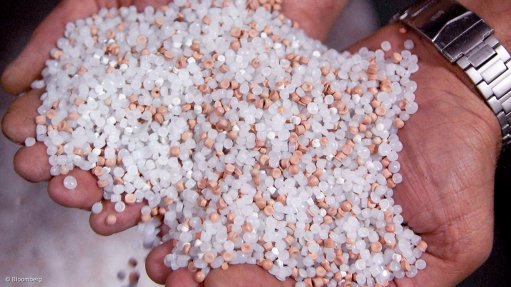
RECYCLING SUPPORT Polyco’s project support will increase the tons of polyolefins collected by about 40 000 t over the next three years
Photo by: Bloomberg
South Africa-based Polyolefin Recycling Company (Polyco) will have three project funding cycles in 2015 and has budgeted R14-million to support key collection and recycling projects, Polyco CEO Mandy Naudé tells Engineering News.
“Polyco’s project support programme is based on a continuous cycle of project funding, addressing the needs of the various sectors in the plastics recycling value chain. Our project support will increase the tons of polyolefins collected by about 40 000 t over the next three years,” she explains.
Last year, Polyco had two funding cycles targeting collectors and recyclers with a combined support value of R11-million.
“The biggest problem facing the plastics industry currently is sufficient availability of clean, separated material required by recyclers, therefore, Polyco’s project support programme focuses on this area. The increased demand for recycled polyolefin polymer content in the manu- facture of certain plastic products is highlighting this supply shortage,” Naudé comments.
She notes that, over the past two years, there has been a significant increase in the production of irrigation and agricultural piping, as well as game fence poles made from recycled poly- olefin polymers. “A number of recyclers are investing in downstream extrusion equipment to add value to the recycled plastic pellets.”
Naudé adds that the polyolefin recycling market has to grow in order to meet the Industry Waste Management Plan target for plastic, which is 35%, or 238 000 t, by 2019.
Polyolefin plastic packaging consumes 508 000 t/y of polymer, which is the largest plastic polymer in volume, providing Polyco with the most significant opportunity to assist the industry in reducing the amount of plastic packaging waste going to landfill. At the end of 2013, the polyolefin plastics recycling rate in South Africa was 31.5%, or 159 000 t.
Recycled plastic can be recycled into a variety of products. High-density polyethylene is recycled to produce crates and bins, pallets, carrier bags, traffic barrier cones, pipes, refuse bags, drums and outdoor furniture.
Recycled low-density polyethylene and linear low-density polyethylene are used to produce bags, dustbins, irrigation pipes, water pipes, furniture covers, construction film, refuse bags and containers.
Buckets, bowls, refuse bins, shopping baskets and trolleys, coat hangers, outdoor furniture, paint trays, flower pots, storage containers and toys are manufactured from recycled polypropylene.
“For every ton of polyolefin packaging that is recycled, a ton of plastic product is diverted from landfill. It also means that South Africa is reusing these resources more efficiently and the country is entering into a more circular, or closed loop economy, where we continuously extract value from existing materials, as apposed to consuming new resources,” Naudé concludes.